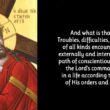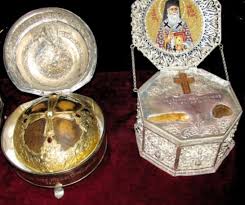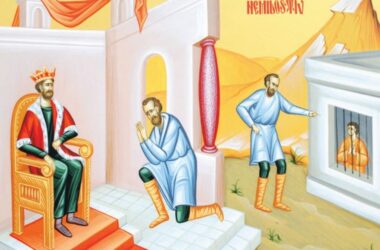1. Why the Creed teaches us in article XI and XII the same saving truths article VII speaks about?
The Creed in its ending articles teaches us indeed the same saving truths found in article VII. The difference is that: in article VII we are advised to believe while the last articles teach us not only to believe in these truths but also hope.
The Creed ends with this joyful confession: `I look for the resurrection of the dead,and the life of the world to come.`
The word `wait ` says that I want it, meaning the resurrection of the dead and the life of the world to come is a truth we do not only believe but also hope. Apostle Peter teaches us the same: `Therefore, with minds that are alert and fully sober, set your hope on the grace to be brought to you when Jesus Christ is revealed at his coming.`(I Peter 1, 13).
2. What is Christian hope?
Christian hope is the longing and trustful waiting of the accomplishment of the promises made by God to the man who fulfill His will because God is faithful in everything He promises.
Righteous old God fearing Simeon to whom the Holy Spirit had promised that he would not have seen death until seeing Christ waited with steady faith the accomplishment of this divine promise. (Luke 2, 25-26).
The hope is the trust someone has in certain future accomplishments and in his sharing those accomplishments. Thus the hope in the resurrection of the dead and the sharing of the eternal bliss gave to the saint martyrs the strength to endure such terrible torments and give their life for faith (II Mac. 7,9). Therefore hope is a gift, is the expectance of the soul to receive a promised good and on the other side is the steady trust in the accomplishment of the promise made to us by God. It is a furtherance, a leap in time, in the future, it is a spyglass that brings near our spiritual eyes the remote things. `Hope means real trust in God given to the human heart by divine inspiration and enlightenment so that men would never despair about the grace of God given for the forgiveness of our sins and for any other request when a good thing is asked either from those that are ephemeral or from the eternal ones.
3. What are the blessings promised to us by God?
Our Lord and Savior Jesus Christ promises eternal life to those who accomplish the will of the Father as well as the power and the necessary means through which is gained this bliss: divine grace, aid in troubles and the hearing of our prayer.
1. The Savior promised us `eternal life` (I John 2, 25). `In my Father’s house are many mansions: if it were not so, I would have told you. I go to prepare a place for you. ` (John 14, 2). In the parable of the wedding of the king’s son (Matthew 22, 1), of those invited at supper (Luke 14, 16), of the workers of the vineyard (Mark 12, 1) and others we find this same promise. He also promised us the resurrection from the dead. (John 5, 28, 29).
2. In order to gain eternal bliss our Saviour promised the help of the Holy Spirit, of the grace of God. Our Lord Jesus Christ, `our hope` (I Tim. 1, 1), wants the salvation of all men (I Tim. 2, 4); but His grace is absolutely necessary for salvation (John 3, 5).
3. He promised us the goods necessary for our earthly life: So do not worry, saying, ‘What shall we eat?’ or ‘What shall we drink?’ or ‘What shall we wear?’ For the pagans run after all these things, and your heavenly Father knows that you need them.` (Matthew 6, 31-32). The proofs are the birds of the sky He feeds and the lilies of the field He adorns and He has even greater care of men. The saints found themselves many times in harsh times: they had no shelter, no clothes, but by trusting in God’s promises they spent their life without caring about these things and the divine help was never missed.
4.Jesus Christ our Lord also promised us the forgiveness of our sins if we repent and change our life. Since He says: `there will be more rejoicing in heaven over one sinner who repents than over ninety-nine righteous persons who do not need to repent.` (Luke 15, 7). The parable with the lost sheep (Luke 15, 3-6) and the one with the prodigal son (Luke 15, 11-32) prove how much God wills to forgive us. As long as we live the hope to repent is not lost. Since one of the thieves crucified in the same time with Christ received forgiveness before his death (Luke 23, 43). Ezekiel tells us that God does not want the death of the sinner but to return and be alive (Ez. 18, 32).
5. Christ our Saviour promised us help in troubles because: `God is our refuge and strength, a very present help in trouble.` (Ps. 45,1). But sometimes His help is left to be waited longer as it is for example at the wedding from Cana of Galilee, when He says: My time has not come yet. (John 2,4). But this help the longer is waited the stronger and more wondrous it works, like in the parable when the storm from the sea of Tiberias is calmed down (Matthew 8, 26); the release from prison of the holy apostles, Paul and Silas (Acts 16, 25, 32).
6. Ultimately Jesus Christ promised He shall listen to our prayers : `You may ask me for anything in my name, and I will do it.` (John 14, 14) and `I say unto you, Whatsoever ye shall ask the Father in my name, he will give it you.` (John 16, 23). And in the Lord’s prayer He taught us to ask from the heavenly Father all the goods necessary to us.
4. Where does Christian hope spring from ?
Christian hope springs from the faith in everything was promised to us by God.
(Gal. 5, 5). Faith assures us that God is mostly faithful, powerful and kind and we hope that by His grace and by the sacrifice of the Saviour we shall receive from Him the promised good..
Hope comes from faith ( 282 Sf. Gregory the Theologian, De animae restrictione, Migne, P. G., XLVI, col. 29), as the tree comes out from its root. Faith attests the promised goods and the chance to have them. But hope maes us want them and wait for them. So we believe that the One who told us not to lie will not be a liar. That is why saint Paul says too: Let us hold unswervingly to the hope we profess, for he who promised is faithful. (Hebrews 10, 23).
We are fully convinced of the truth that God for whom there is nothing impossible (Luke 1,37) has the power to fulfill the promises (Rom. 4, 21), that God Who is love (I John 4, 8), gives more than we are able to receive, that God intercessed for us by the incomparable sacrifice of His Son eternal bliss and the means to gain it.
`He who did not spare his own Son, but gave him up for us all—how will he not also, along with him, graciously give us all things?` (Rom. 8,32). The unshaken trust that God is perfect, faithful, powerful and kind is called faith in God. This faith is the root and the stronger it is the steadier is our hope. This faith cured the woman who touched the hems of the Saviour’s robe when He was going towards Jairus’house. (Matthew 9, 22)









